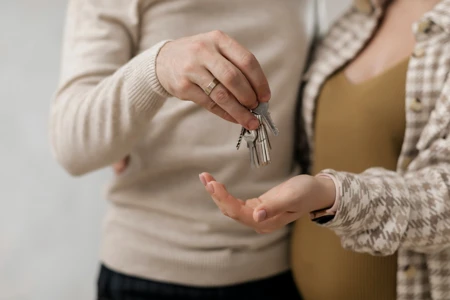 Written by: Danny Belton - Head of Lending
Written by: Danny Belton - Head of Lending
Before you embark on this shared financial journey, it's crucial to understand how joint mortgages work and the potential implications involved. While it works for many, everyone’s circumstances are unique. Here’s everything you need to know:
What is a joint mortgage?
Simply put, a joint mortgage is a loan taken out by two or more people to purchase a property. They share the responsibility of repaying the loan and become joint owners of the property. This can be beneficial as it allows individuals to combine their incomes and borrowing power, potentially qualifying for a larger loan and a more desirable property.
Who can get a joint mortgage?
Joint mortgages are most common among couples, married or unmarried, but they can also involve friends, family members, or even business partners. Lenders typically have specific criteria regarding the relationship and financial stability of each borrower.
If you’re looking to buy a house with a friend - we have an article that goes into further detail on the subject:
Types of joint ownership
There are two main types of joint ownership when it comes to joint mortgages:
Joint tenants
In this scenario, each borrower owns an equal share (usually 50%) of the property, regardless of their financial contribution. If one joint tenant passes away, their share automatically transfers to the surviving owner.
Tenants in common
Each borrower owns a specific, predetermined share of the property, which can be unequal. Upon death, their share goes to their beneficiary as outlined in their will.
Before you apply for a joint mortgage
Open communication
Discuss financial expectations, contributions, and ownership structure openly and honestly with all involved parties.
Exit strategy
Plan for potential disagreements or changes in circumstances down the line. How will the property be sold or ownership transferred?
Legal advice
Consider seeking legal guidance to understand the different ownership structures and their implications.
Stay financially safe
If something were to happen to you, would the co-owner of your property be able to maintain monthly repayments? If not, click the button below to learn more about life insurance and how it could help.
Joint mortgages can be a great way to achieve homeownership, but they require careful consideration and clear communication. Weigh the benefits and risks before diving in, and consult a mortgage adviser and legal professionals for personalised advice.
Important information
Your home may be repossessed if you do not keep up repayments on your mortgage.
There may be a fee for mortgage advice. The actual amount you pay will depend on your circumstances. The fee is up to 1% but a typical fee is 0.3% of the amount borrowed.
Related Articles
From renting to homeownership: how the MyMAB app can help you buy a house
Looking for an app to help you get on the property ladder? Look no further than the MyMAB app.
< 70 views | 1 year ago
How to get mortgage ready
Getting mortgage ready means making sure you're as prepared as you can be when the time comes to submit your paperwork. Here's what you need to know.
170 views | 2 years ago
Getting a joint mortgage when my partner has bad credit
What if your partner's credit score throws a wrench in your mortgage aspirations?
< 40 views | 1 year ago
No posts currently available




